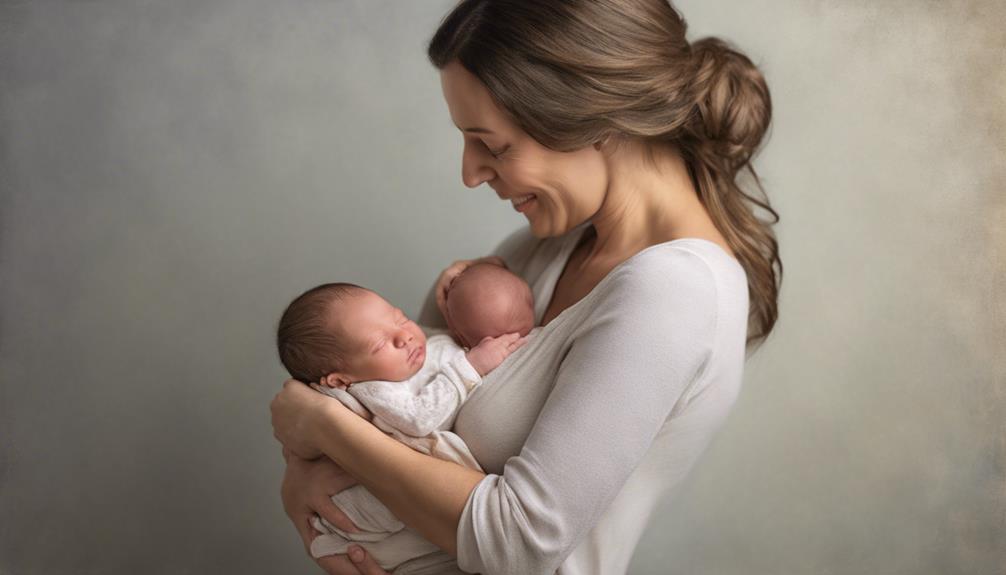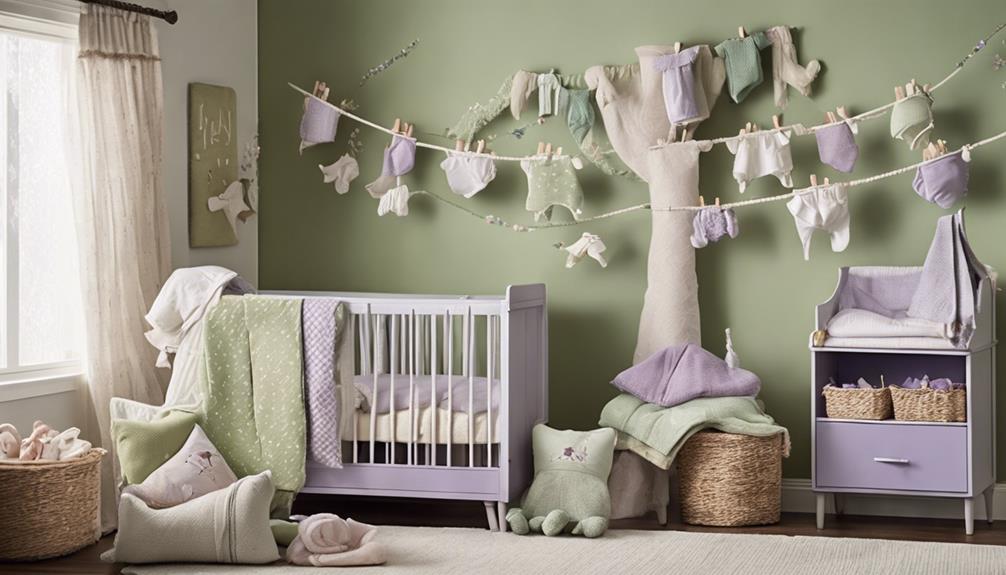Imagine this scenario: Your newborn has been experiencing frequent hiccups, causing some distress.
You might be wondering what gentle methods you can use to alleviate this common issue. By incorporating simple yet effective techniques, you can help soothe your baby and provide relief.
These methods not only offer comfort but also promote a sense of calmness for your little one.
Key Takeaways
- Pat or rub the back and offer a pacifier to soothe hiccups.
- Hold baby upright after feeding for digestion.
- Opt for smaller, frequent feedings to prevent overeating.
- Create a calm environment to aid natural resolution of hiccups.
Causes of Newborn Hiccups
Newborn hiccups stem from involuntary spasms of the diaphragm muscle, a key player in your baby's breathing function. When your little one eats too quickly, swallows air during feeding, or experiences stomach bloating from overfeeding, these factors can trigger those adorable yet sometimes concerning hiccups.
Additionally, the Tonic Neck Reflex, a common newborn reflex, may also play a role in causing those rhythmic contractions of the diaphragm. In some cases, gastroesophageal reflux disease (GERD) can lead to more frequent hiccups in newborns.
The good news is that these hiccups are typically harmless and tend to resolve on their own as your baby's body matures and adjusts to the new world outside the womb. Understanding the various triggers for your baby's hiccups can help you navigate this normal but sometimes worrisome occurrence with more confidence and ease.
Soothing Techniques for Hiccups

To ease your newborn's hiccups, employing gentle techniques like patting or rubbing their back can help release trapped air bubbles and provide relief. Offering a pacifier for your baby to suck on may also help relax the diaphragm and stop the hiccups.
Sometimes, simply changing your baby's position, such as holding them upright against your chest, can aid in stopping the hiccups. Remember, allowing the hiccups to resolve naturally within 5 to 10 minutes is usually effective and safe.
During this time, try to create a calm environment to prevent overstimulation, as sudden movements can exacerbate your baby's discomfort. By staying close, soothing your newborn, and using these simple techniques, you can help your little one through this common occurrence of hiccups with care and patience.
Positioning Tips for Hiccups

When addressing hiccups in your newborn, consider adjusting their positioning to help alleviate discomfort and promote digestion. Here are some positioning tips to assist you:
- Hold your newborn upright after feeding: This can aid digestion and prevent regurgitation, reducing the chances of hiccups.
- Place your baby slightly upright during feeding: Minimize air swallowing by keeping them in a slightly elevated position.
- Keep your newborn's head elevated while sleeping: Gravity can help prevent stomach contents from flowing back up, potentially reducing hiccups.
- Use a supportive, firm mattress: Opting for this type of surface for your baby's sleep can promote proper positioning and decrease hiccups during rest.
Feeding Strategies for Hiccups

When addressing hiccups in your newborn, adopting effective feeding strategies can play an important role in alleviating discomfort and reducing episodes of hiccups. Burping your newborn during and after feedings helps release trapped air, preventing hiccups. Offering smaller, more frequent feedings can prevent overeating and reduce hiccups. Keeping your baby upright after feeding aids in digestion and minimizes hiccups. Avoid rapid or forceful feeding to reduce air intake and prevent hiccups. Proper bottle feeding techniques and ensuring a good latch while breastfeeding can also help prevent hiccups in your newborn. Here is a table summarizing feeding strategies for hiccups:
| Feeding Strategies | Benefits |
|---|---|
| Burping | Releases trapped air |
| Smaller, frequent feedings | Prevents overeating |
| Upright position | Aids digestion and reduces hiccups |
| Avoid rapid feeding | Reduces air intake |
| Proper latch | Prevents hiccups during breastfeeding |
Preventing Hiccups in Newborns

Help your newborn avoid hiccups by implementing simple yet effective preventive measures.
- Burping: Remember to burp your newborn during and after feedings to release trapped air, reducing the chances of hiccups.
- Frequent Feedings: Opt for smaller, more frequent feedings to help prevent hiccups in your newborn.
- Upright Position: Keep your baby upright for about 20-30 minutes after feeding to aid in digestion and decrease the likelihood of hiccups.
- Avoid Overfeeding: Be mindful not to overfeed your newborn to prevent stomach distention, which can lead to hiccups.
Frequently Asked Questions
How Can I Soothe My Newborn's Hiccups?
To soothe your newborn's hiccups, try burping them, offering a pacifier, gently rubbing their back, changing their position, and ensuring a calm feeding environment. These simple actions can help relieve hiccups and bring comfort.
Is It OK to Lay Baby Down With Hiccups?
Yes, it's perfectly fine to lay your baby down with hiccups. Hiccups are common and harmless. If they persist or cause concern, seek advice from a pediatrician. For reflux-related hiccups, keeping your baby upright can help.
What Positions Help Newborn With Hiccups?
To help your newborn with hiccups, try holding them upright against your chest, placing them on their tummy across your lap with gentle pressure on their back, keeping them slightly upright while feeding, or gently rocking them.
Do Hiccups Mean Baby Is Full?
Sometimes, hiccups in babies don't mean they're full. Hiccups are just a normal reflex. Keep feeding your baby even if they hiccup – it's not a sign they're satisfied. Relax and continue caring for your little one.
Conclusion
To sum up, helping your newborn with hiccups can be done gently and effectively using soothing techniques, proper positioning, and feeding strategies.
Remember, it's important to seek medical advice if hiccups persist.
So, why not try these simple techniques to provide comfort for your little one and guarantee their well-being?









